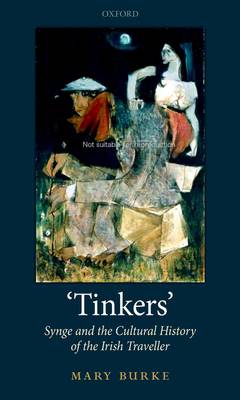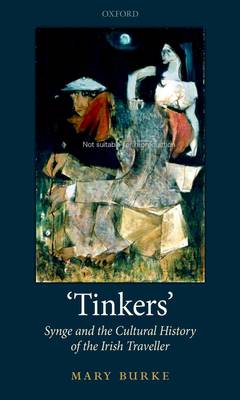
Bedankt voor het vertrouwen het afgelopen jaar! Om jou te bedanken bieden we GRATIS verzending (in België) aan op alles gedurende de hele maand januari.
- Afhalen na 1 uur in een winkel met voorraad
- Gratis thuislevering in België
- Ruim aanbod met 7 miljoen producten
Bedankt voor het vertrouwen het afgelopen jaar! Om jou te bedanken bieden we GRATIS verzending (in België) aan op alles gedurende de hele maand januari.
- Afhalen na 1 uur in een winkel met voorraad
- Gratis thuislevering in België
- Ruim aanbod met 7 miljoen producten
Zoeken
€ 91,95
+ 183 punten
Omschrijving
The history of Irish Travellers is not analogous to that of the 'tinker', a Europe-wide underworld fantasy created by sixteenth-century British and continental Rogue Literature that came to be seen as an Irish character alone as English became dominant in Ireland. By the Revival, the tinker represented bohemian, pre-Celtic aboriginality, functioning as the cultural nationalist counter to the Victorian Gypsy mania. Long misunderstood as a portrayal of actual Travellers, J.M. Synge's influential The Tinker's Wedding was pivotal to this 'Irishing' of the tinker, even as it acknowledged that figure's cosmopolitan textual roots. Synge's empathetic depiction is closely examined, as are the many subsequent representations that looked to him as a model to subvert or emulate. In contrast to their Revival-era romanticization, post-independence writing portrayed tinkers as alien interlopers, while contemporaneous Unionists labeled them a contaminant from the hostile South. However, after Travellers politicized in the 1960s, more even-handed depictions heralded a querying of the 'tinker' fantasy that has shaped contemporary screen and literary representations of Travellers and has prompted Traveller writers to transubstantiate Otherness into the empowering rhetoric of ethnic difference. Though its Irish equivalent has oscillated between idealization and demonization, US racial history facilitates the cinematic figuring of the Irish-American Traveler as lovable 'white trash' rogue. This process is informed by the mythology of a population with whom Travelers are allied in the white American imagination, the Scots-Irish (Ulster-Scots). In short, the 'tinker' is much more central to Irish, Northern Irish and even Irish-American identity than is currently recognised.
Specificaties
Betrokkenen
- Auteur(s):
- Uitgeverij:
Inhoud
- Aantal bladzijden:
- 344
- Taal:
- Engels
Eigenschappen
- Productcode (EAN):
- 9780199566464
- Verschijningsdatum:
- 28/09/2009
- Uitvoering:
- Hardcover
- Formaat:
- Genaaid
- Afmetingen:
- 140 mm x 216 mm
- Gewicht:
- 585 g

Alleen bij Standaard Boekhandel
+ 183 punten op je klantenkaart van Standaard Boekhandel
Beoordelingen
We publiceren alleen reviews die voldoen aan de voorwaarden voor reviews. Bekijk onze voorwaarden voor reviews.












